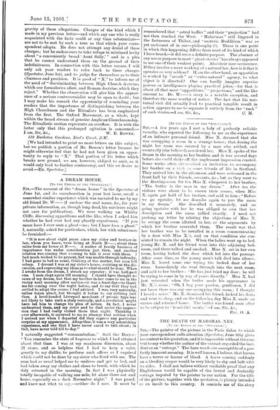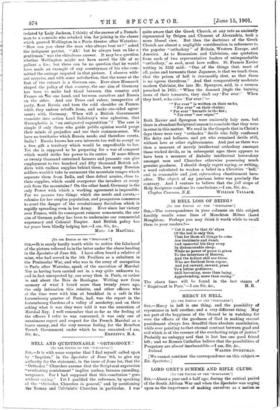THE DEATH OF MARSHAL NEY.
jTo ill!: EDITOR. Or THE " SPECTATOU." j S1R,—The painter of the picture in the Paris Salon to which your correspondent calls attention (Spectator, June 8th) gives no context to his quotation, and it is impossible without the con- text to say whether the author of the 'extract regarded the inci- dent as an " outrage." The bare words are susceptible of a per- fectly innocent meaning. It is well known, I believe, that horses have a terror or horror of blood. A horse coming suddenly on a bleeding corpse would be very likely to shy and bolt with its rider. I shall not believe without verifiable proof that any Englishman would be capable of the brutal and dastardly outrage imputed by the painter to our nation. For the title of the picture, together with the quotation, is plainly intended as an insult to this country. It reminds me of the story (related by Lady Jackson, I think) of the answer of a French- man to a comrade who rebuked him for joining in the cheers which greeted Wellington in a Paris theatre after Waterloo: " How can you cheer the man who always beat us ?" asked the indignant patriot. " Alt! but he always beat us like a gentleman." was the chivalrous answer. It may be a question whether Wellington might not have saved the life of so gallant a foe; but there can be no question that he would have made an example of any countryman of his who com- mitted the outrage imputed in that picture. I observe with- out surprise, and with some satisfaction, that the name at the foot of the extract is a German one. Ever since Bismarck shaped the policy of that country, the one aim of Germany has been to make bad blood between this country and France on the one hand, and between ourselves and Russia on the other. And our Press and rulers, irrespective of party, flout Russia and turn the cold shoulder on France, while they endure rebuffs from, and make one-sided agree- ments . with, Germany. When will a British Government translate into action Lord Salisbury's wise aphorism, that Russophobia is " an antiquated superstition " ? The case is simple if only those who guide public opinion would purge their minds of prejudice and use their common-sense. We have no territories which Russia needs, and therefore covets. India? Russia knows her own interests too well to accept as a free gift a territory which would be unprofitable to her. Yet she. is supposed to be preparing for a war of conquest which would strike her power to its centre. If some fifteen or twenty thousand untrained farmers and peasants can give employment to two hundred and fifty thousand British sol- diers with endless supplies behind them, how many Russian soldiers would it take to surmount the mountain ranges which separate them from India, and then defeat armies, close to their supplies, which could overpower the invaders at every exit from the mountains On the other hand, Germany is the only Power with which a working agreement is impossible. For we possess two things which she needs and covets,— colonies for her surplus population, and prosperous commerce to avert the danger of the revolutionary Socialism which is rapidly spreading even in her Army. Ever since her victory over France, with its consequent ruinous armaments, the one aim of German policy has been to undermine our commercial supremacy and Colonial Empire. And British policy has for years been blindly helping her.—I am, Sir, &c.,
MALI :LM MacCoLL.











































 Previous page
Previous page